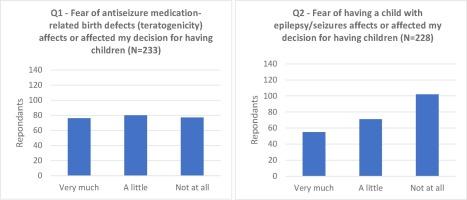育龄女性癫痫患者对生育风险的认识。
IF 2.3
3区 医学
Q2 BEHAVIORAL SCIENCES
引用次数: 0
摘要
背景:生孩子或计划生孩子可能会给癫痫妇女带来许多问题。癫痫发作和抗癫痫药物(ASMs)会影响避孕、胎儿/儿童早期发育和孕产妇健康。关于患者对生育风险的看法以及这些看法如何影响生育决策,人们知之甚少:作为一项质量改进措施,我们在医疗系统内向主要诊断为癫痫/癫痫发作的 21-45 岁女性发放了一份电子调查问卷。然后,我们进行了一项探索性研究,调查癫痫和 ASM 对生殖健康和决策风险的看法。此外,我们还对临床特征进行了调查,因为这些特征可能是影响生育决策的恐惧的预测因素:共收到 267 份回复(回复率为 32%);根据排除标准,233 名回复者被纳入研究。关于对 ASM 致畸性的恐惧对生育决定的影响,受访者的回答不一(33% 非常恐惧,34% 有点恐惧,33% 完全不恐惧)。45% 的受访者表示,对孩子患有癫痫/癫痫发作的恐惧完全不会影响他们的生育决定,但 24% 的受访者表示,这种恐惧非常影响他们的生育决定。总共有 42% 的受访者表示他们已经有了孩子。当我们评估某些临床特征的影响时,我们发现 ASM 数量和丙戊酸的使用会影响生育决策,而其他预期特征(如药物难治性和惊厥性癫痫发作)则不会:讨论:我们发现对风险的认识存在差异。总之,我们的数据证明了偏好的个性化以及在指导患者做出生育决定时提供个性化咨询的必要性。本文章由计算机程序翻译,如有差异,请以英文原文为准。

Perceptions of reproductive risk among women with epilepsy of childbearing age
Background
Having children or planning to have children may raise many questions for women with epilepsy. Seizures and antiseizure medications (ASMs) impact contraception, fetal/early childhood development, and maternal health. Little is known regarding patients’ perspectives about reproductive risk and how those perspectives influence reproductive decision-making.
Methods
As a quality improvement initiative, we distributed an electronic survey within our health system to women ages 21–45 with a primary diagnosis of epilepsy/seizures. We then performed an exploratory research study to investigate perceptions of risk of epilepsy and ASMs on reproductive health and decision making. Additionally, we looked at clinical characteristics as possible predictors of fear impacting reproductive decisions.
Results
There were 267 responses (32% responder rate); after exclusion criteria, 233 respondents were included in the study. There were mixed responses about how fear of ASM teratogenicity impacted decisions about having children (33% very much, 34% a little, 33% not at all). While 45% responded that fear of having a child with epilepsy/seizures did not at all affect decisions about having children, for 24% this very much affected their decision. In total 42% of respondents reported they had had children. When we evaluated the impact of certain clinical characteristics, we found ASM number and valproic acid use impacted reproductive decision making, while other expected characteristics (e.g., drug-refractoriness and convulsive seizures) did not.
Discussion
We found variation in perceptions of risk. Overall, our data support the very personalized nature of preferences and the need for individualized counseling when guiding patients in reproductive decision making.
求助全文
通过发布文献求助,成功后即可免费获取论文全文。
去求助
来源期刊

Epilepsy & Behavior
医学-行为科学
CiteScore
5.40
自引率
15.40%
发文量
385
审稿时长
43 days
期刊介绍:
Epilepsy & Behavior is the fastest-growing international journal uniquely devoted to the rapid dissemination of the most current information available on the behavioral aspects of seizures and epilepsy.
Epilepsy & Behavior presents original peer-reviewed articles based on laboratory and clinical research. Topics are drawn from a variety of fields, including clinical neurology, neurosurgery, neuropsychiatry, neuropsychology, neurophysiology, neuropharmacology, and neuroimaging.
From September 2012 Epilepsy & Behavior stopped accepting Case Reports for publication in the journal. From this date authors who submit to Epilepsy & Behavior will be offered a transfer or asked to resubmit their Case Reports to its new sister journal, Epilepsy & Behavior Case Reports.
 求助内容:
求助内容: 应助结果提醒方式:
应助结果提醒方式:


